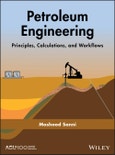A comprehensive and practical guide to methods for solving complex petroleum engineering problems
Petroleum engineering is guided by overarching scientific and mathematical principles, but there is sometimes a gap between theoretical knowledge and practical application. Petroleum Engineering: Principles, Calculations, and Workflows presents methods for solving a wide range of real-world petroleum engineering problems. Each chapter deals with a specific issue, and includes formulae that help explain primary principles of the problem before providing an easy to follow, practical application.
Volume highlights include:
- A robust, integrated approach to solving inverse problems
- In-depth exploration of workflows with model and parameter validation
- Simple approaches to solving complex mathematical problems
- Complex calculations that can be easily implemented with simple methods
- Overview of key approaches required for software and application development
- Formulae and model guidance for diagnosis, initial modeling of parameters, and simulation and regression
Petroleum Engineering: Principles, Calculations, and Workflows is a valuable and practical resource to a wide community of geoscientists, earth scientists, exploration geologists, and engineers. This accessible guide is also well-suited for graduate and postgraduate students, consultants, software developers, and professionals as an authoritative reference for day-to-day petroleum engineering problem solving.
Table of Contents
Preface vii
Acknowledgments ix
1 Petroleum System and Petroleum Engineering 1
2 Petroleum Reservoir Rock Properties 17
3 Reservoir Fluid Properties 65
4 Equations of States 103
5 Formation Evaluation 121
6 Formation Testing 181
7 Fluid Flow in Reservoirs 211
8 Well Test Analysis 243
9 Reservoir Inflow Performance 327
10 Well Production System 369
11 Production System Analysis 397
12 Reservoir Material Balance 421
13 Decline Curve Analysis 451
14 Secondary and Tertiary Recovery Methods 459
Index 503








